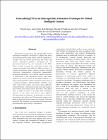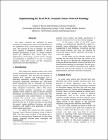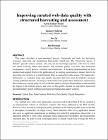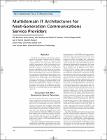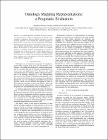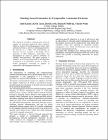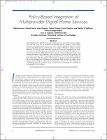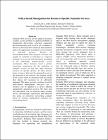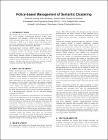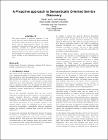Browsing by Author "O'SULLIVAN, DECLAN"
Now showing items 26-45 of 57
- Sort by:
- title
- issue date
- submit date
- Order:
- ascending
- descending
- Results:
- 5
- 10
- 20
- 40
- 60
- 80
- 100
-
Generalizing ITS as an Interoperable Annotation Technique for Global Intelligent Content
LEWIS, DAVID; O'CONNOR, ALEXANDER; BRENNAN, ROB; O'SULLIVAN, DECLAN (2013)This paper considers how the interoperable content annotation techniques developed to address the needs of localization processing chains could be applied to a broader class of content processing. We extract the content ... -
Grouping abstraction and authority control in policy-based spectrum management
ARGYROUDIS, PATROKLOS; FEENEY, KEVIN; LEWIS, DAVID; NOLAN, KEITH EDWARD; O'SULLIVAN, DECLAN (IEEE, 2007)The management of dynamic spectrum access requires the coordination of administrative functions across multiple organizations, from regulators to secondary market operators and commons cooperatives. Policy-based management ... -
Implementing the Draft W3C Semantic Sensor Network Ontology
O'SULLIVAN, DECLAN; BRENNAN, ROB (multicon verlag and IEEE Xplore, 2010)This paper examines the feasibility of using ontologies to model generic sensor networks, based on the capabilities of the current generation of ontology tools. The creation of such an ontology, the current tool’s ... -
Improving curated web-data quality with structured harvesting and assessment
O'SULLIVAN, DECLAN; BRENNAN, ROB (2014) -
Improving scalability in pub-sub knowledge-based networking by semantic clustering
KEENEY, JOHN; LEWIS, DAVID; O'SULLIVAN, DECLAN; JONES, DOMINIC HUGH (2007) -
Knowledge Based Networking
KEENEY, JOHN; LEWIS, DAVID; O'SULLIVAN, DECLAN; JONES, DOMINIC HUGH; SONG, GUO (IGI Global, 2009)Knowledge-Based Networking, which is built on-top of Content-based Networking (CBN), involves the forwarding of events across a network of brokers based on subscription filters applied to some semantics of the data and ... -
Knowledge-based Networking
O'SULLIVAN, DECLAN; LEWIS, DAVID; KEENEY, JOHN; JONES, DOMINIC HUGH (2008) -
Knowledge-based Semantic Clustering
KEENEY, JOHN; LEWIS, DAVID; O'SULLIVAN, DECLAN (2008)Users of the web are increasingly interested in tracking the appearance of new postings rather than locating existing knowledge. Coupled with this is the emergence of the Web 2.0 movement (where everyone effectively ... -
Multidomain IT architectures for next-generation communications service providers [Next-Generation Telco IT Architectures]
O'SULLIVAN, DECLAN; BRENNAN, ROB; FEENEY, KEVIN; KEENEY, JOHN (2010)Enabling interdomain and end-to-end management are major challenges for IT architectures supporting agile next-generation communications service providers. This requires explicit management of the interdomain relationships ... -
Multilingual Ontology Mapping: Challenges and a Proposed Framework
BRENNAN, ROB; FU, BO; O'SULLIVAN, DECLAN (The Society for the Study of Artificial Intelligence and the Simulation of Behaviour, 2009)A key problem in supporting multilingual information retrieval and digital content management is reasoning about overlapping context domains. Ontologies are currently emerging as representation techniques for overlapping ... -
On the role of ontological semantics in routing contextual knowledge in highly distributed autonomic systems
KEENEY, JOHN; LEWIS, DAVID; O'SULLIVAN, DECLAN (Trinity College Dublin, 2006)Much recent research has focused on applying Autonomic Computing principles to achieve constrained self-management in adaptive systems, through self-monitoring and analysis, strategy planning, and self adjustment. ... -
Ontology Mapping Representations: a Pragmatic Evaluation
BRENNAN, ROB; THOMAS, HENDRIK; O'SULLIVAN, DECLAN (Knowledge Systems Institute Graduate School, 2009)A common approach to mitigate the effects of ontology heterogeneity is to discover and express the specific corre-spondences (mappings) between different ontologies. An open research question is: how should such ontology ... -
Ontology-based engineering for self-managing communications
FEENEY, KEVIN; KEENEY, JOHN; LEWIS, DAVID; O'SULLIVAN, DECLAN; POWER, RUAIDHRI SEAN (multicon verlag, 2006)Ontology-based semantics support encoding and mapping between separately authored and thus heterogeneous knowledge, and is expressed in widely accepted standards (e.g. W3C?s OWL). It has been suggested that ontology-based ... -
Ontology-based semantics for composable autonomic elements
KEENEY, JOHN; LEWIS, DAVID; O'SULLIVAN, DECLAN; WADE, VINCENT PATRICK (2005)The complexity of modern communication networks requires an autonomic approach, where elements exhibit a degree of self-management which when combined provide a level of self-management for the network as a whole. The ... -
Open Framework Middleware for Intelligent WSN Topology Adaption in Smart Buildings
BRENNAN, ROB; O'SULLIVAN, DECLAN (IEEE, 2009)Modern smart buildings utilize sensor networks for facilities management applications such as energy monitoring. However as buildings become progressively more embedded with sensor networks, the challenge of managing and ... -
Policy-based Integration of Multi-Provider Digital Home Services
BRENNAN, ROB; KEENEY, JOHN; FEENEY, KEVIN CHEKOV; LEWIS, DAVID; O'SULLIVAN, DECLAN; ETZIONI, ZOHAR (2009)The digital home is both the nexus of a new wave of user-centric service integration and the front line of competition between device vendors, connectivity providers, and added-value service providers. Vertical integration ... -
Policy-based management for resource-specific semantic service
KEENEY, JOHN; LEWIS, DAVID; O'SULLIVAN, DECLAN (IEEE, 2006)Semantic Web Services are the subject of intense scrutiny as they promise to address problems of dynamically discovering, selecting, composing and interoperating web services for e-commerce. However, there has been ... -
Policy-based Management of Semantic Clustering
KEENEY, JOHN; LEWIS, DAVID; O'SULLIVAN, DECLAN; JONES, DOMINIC HUGH (2008)We introduce the concept of a Knowledge-based Network KBN [1] as an extended Content-based Network (CBN), where semantically rich messages co-exist with the more traditional CBN messages format. One of the main advantages ... -
A proactive approach to semantically oriented service discovery
KEENEY, JOHN; LEWIS, DAVID; O'SULLIVAN, DECLAN (2006)This paper proposes a proactive approach to web service discovery which contrasts the passive approach exhibited by UDDI. The paper describes how a content based network implementation (Siena) has been extended to ... -
Resolving queries in a heterogeneous context rich environment
CONLAN, OWEN; LEWIS, DAVID; O'SULLIVAN, DECLAN; POWER, RUAIDHRI SEAN; WADE, VINCENT PATRICK (2004)The vision of ubiquitous computing is that of many computing devices interacting in a natural way with humans in the real world. The software running on these devices is currently limited in how it can provide for users? ...




